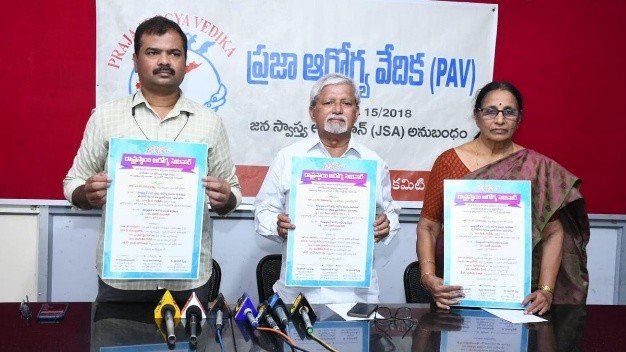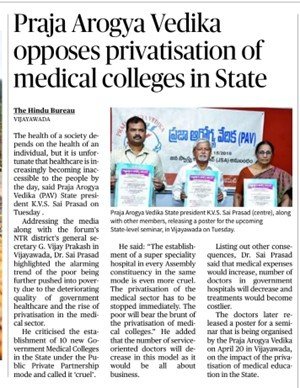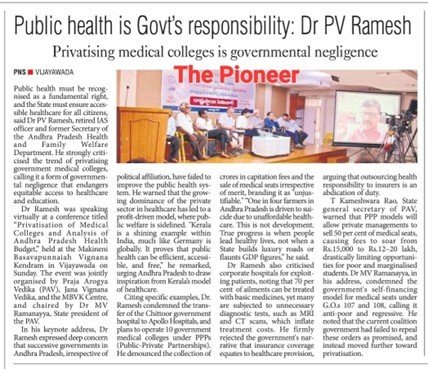By Kameshwar Rao and Abhay Shukla
This report was first published by Jan Swasthya Abhiyan (JSA) on their website
ttps://phmindia.org/2025/07/01/corporate-hands-off-public-medical-colleges/

“Thousands of doctors have graduated from government medical colleges in Andhra Pradesh, and have attained prestigious positions in the medical field in India and across the world, thanks to the quality medical education they received. Today I appeal to all alumni of Andhra Medical College to keep in mind the value of public medical education which they benefitted from, and to support the struggle against commercialisation of medical colleges in Andhra Pradesh.”
• P. Rama Rao, Retired District Medical and Health Officer, Andhra Pradesh
Over the past decade, India has witnessed an accelerating trend of handing over vital public health assets—especially government medical colleges and hospitals—to private operators. Among the most blatant such moves is the recent decision by the Andhra Pradesh (AP) government to privatise medical education and tertiary healthcare by transferring long-term control of ten new medical colleges to corporate entities. However, this retrograde decision is now facing powerful resistance from an emerging grassroots movement across AP, with implications that extend well beyond the state.
An anti-people decision
In early 2025, the Andhra Pradesh government, led by Chief Minister N. Chandrababu Naidu, announced its decision to develop ten government medical colleges under a Public–Private Partnership (PPP) model. On 5 March 2025, the State Health Minister Satya Kumar Yadav informed the Legislative Council that the government would build or complete ten medical colleges and hand them over to private operators under this model.
The government cited two earlier orders—GO 107 and GO 108—which had already paved the ground by increasing the number of ‘self-financing’ seats and raising annual tuition fees for certain categories of MBBS students to between Rs. 12 and Rs. 20 lakh. Effectively, this means medical education for many students in AP would now cost close to Rs. 1 crore even in government institutions. The current proposal envisages leasing ten of the seventeen newly built medical colleges—each developed at an average cost of Rs. 500 crore in public funds—to private entities for a 66-year period, in exchange for a nominal annual fee.

The real cost of handing over Public health assets
This decision has drawn sharp criticism from health activists, civil society groups, student organisations, health professionals, and concerned citizens. Praja Arogya Vedika (PAV), the Andhra Pradesh affiliate of the Jan Swasthya Abhiyan, is at the forefront of this opposition, warning that this model represents a major setback for equitable access to healthcare and medical education. Under the proposed PPP framework, the government would contribute nearly 80% of capital costs (through state and central funds), while the private operator is expected to bring in only 20%—a contribution they would be permitted to raise by mortgaging public land assets. The financial burden would then be passed on to students and patients.
PAV and other critics argue that this shift will make medical education unaffordable for students from economically weaker backgrounds, dilute merit-based admissions, reduce the availability of reserved seats, and erode public accountability. There are also grave concerns about losing control over curricula, hospital infrastructure, and healthcare priorities, with profit rather than public service becoming the driving motive.
Building a popular movement against privatisation in AP
In response to this highly damaging decision, a vigorous and sustained public mobilisation has been developed across Andhra Pradesh, and since the beginning of this year Praja Arogya Vedika has initiated a series of coordinated actions in various parts of the state. On 10 March 2025, a memorandum was submitted to the Health Minister raising constitutional concerns about the commercialisation of public healthcare and violation of the Right to Health. A statewide signature campaign was launched on World Health Day (7 April 2025) across districts like Anantapur and Visakhapatnam, with citizens demanding a complete rollback of the PPP plan.

A major seminar was organised in Vijayawada (20 April) where Dr P.V. Ramesh (Retired Health Secretary, AP), public health expert Dr. David Sudhakar and Dr. G. Samaram (ex-National president, Indian Medical Association) cautioned against the long-term structural consequences of privatising essential health services. Another seminar was organised at Visakhapatnam (21 April) bringing together health professionals, former bureaucrats, student organisations, and civil society groups. Here Dr. K. Satyavara Prasad (Retd. Director of Medical Education, AP) supported the demand to prevent privatisation of government medical colleges. These seminars have been followed by a series of district-level roundtable meetings in Anantapur (23 May), Kakinada (27 May), Guntur (6 June) and Srikakulam (21 June)—where along with health sector organisations and social movements, NEET aspirants and parent groups actively voiced their opposition
Mass conventions build the momentum
One of the most significant events in this campaign was the public convention held in Tirupati on 23 February 2025, attended by over 800 people—mostly students—at the SVIMS Medical College auditorium. The speakers including Ms. Sujata Rao (former Secretary, Health – Govt. of India), Dr P. V. Ramesh (former Secretary, Health – Govt. of Andhra Pradesh) and Dr. Alladi Mohan (Dean, SVIMS Tirupati) asserted that public health is a government responsibility, and the privatisation of medical education would be damaging for students, health professionals, and society at large. Another major event was the convention organised at Nellore on 15 June, with over 500 participants. Here senior cardiologist Dr Virinchi presented various arguments critiquing the privatisation move, which was supported by doctors from People’s Polyclinic, Nellore with participation by large number of students.
A broad coalition of support
This growing campaign has drawn support from a wide spectrum of social constituencies. Students aspiring to enter medical education, their parents and support groups, government doctors’ associations, retired health professionals, and even private doctors have joined the movement. Organisations representing ASHAs, Anganwadi workers, lab technicians from the medical and health departments, retired nurses, and faculty of nursing schools have all lent their voice to this struggle. Trade unions, legal professionals, and grassroots women’s groups are also part of the expanding coalition.

Voices of credibility and concern
Several notable figures from Andhra Pradesh have publicly endorsed this campaign. Ms. Sujatha Rao, former Health Secretary to the Government of India, has publicly stated that such privatisation undermines the basic vision of accessible public healthcare. Dr. G. Samaram, former National president of the Indian Medical Association, has strongly opposed the commodification of government medical education. Dr. P. V. Ramesh, former Health Secretary of Andhra Pradesh, has stressed that this policy will weaken the state’s healthcare delivery system. Mr. EAS Sarma, former Secretary to Government of India has written to the Chief Minister of Andhra Pradesh, asking him to revert the decision of privatisation of public medical colleges.
Students in the forefront
Students have been a dynamic and vocal component of this campaign. Various major student unions such as SFI, AISF, PDSU, RSU, and NSUI—have written to the Chief Minister demanding an immediate reversal of the PPP decision. During 2024, students across campuses in Guntur, Rajahmundry, Vizianagaram, Tirupati, and Visakhapatnam staged hunger strikes, rallies, and protests, highlighting the widespread youth opposition to the commercialisation of public medical colleges.
The hidden hand of NITI Aayog
The current policy push for privatisation of public health institutions has deep roots in the policy framework being promoted by the central government since 2014. On 21 January 2020, NITI Aayog convened a national consultation to promote PPP-based medical colleges in every district. It circulated draft concession agreements and encouraged states to adopt the model, offering Viability Gap Funding (VGF) of up to 30% under the ‘Atmanirbhar Bharat’ stimulus. NHM and the Ministry of Health and Family Welfare have issued guidelines in 2019 for handing over district hospitals to private entities. During 2020–21, central policies have proposed up to 60% VGF, full operational cost recovery, tax incentives, and access to public land—essentially creating a heavily subsidised route for private entry into public healthcare infrastructure.
Linking Andhra with struggles across India: Towards a national movement against privatisation
Recognising the broader implications of this model, Praja Arogya Vedika is now extending its outreach to all 26 districts of Andhra Pradesh, to inform the public and gather wider support. Prominent personalities are being encouraged to write to the Chief Minister urging the withdrawal of the privatisation plan. Media coverage of the movement is also significant. However this is not just an issue concerning Andhra Pradesh, since similar PPP-driven moves for privatisation of public medical colleges are now being pursued in Karnataka, Madhya Pradesh, Maharashtra, Uttar Pradesh, Gujarat, and other states. Keeping in view the entire context, Praja Arogya Vedika is organising a National seminar on 24 August 2025 in Vijayawada, calling upon Jan Swasthya Abhiyan activists and civil society actors from across India to build solidarity and develop a coordinated strategy.
Now is the moment to unite against the onslaught of corporatisation of medical education and healthcare across India. The powerful people’s movement in Andhra Pradesh offers a compelling reference point for a broader national mobilisation. We need to join hands across various states of India to defend public health and medical educational institutions from corporate takeover, and to reclaim public health institutions for ensuring the right to affordable medical education and free, quality healthcare for everyone.
